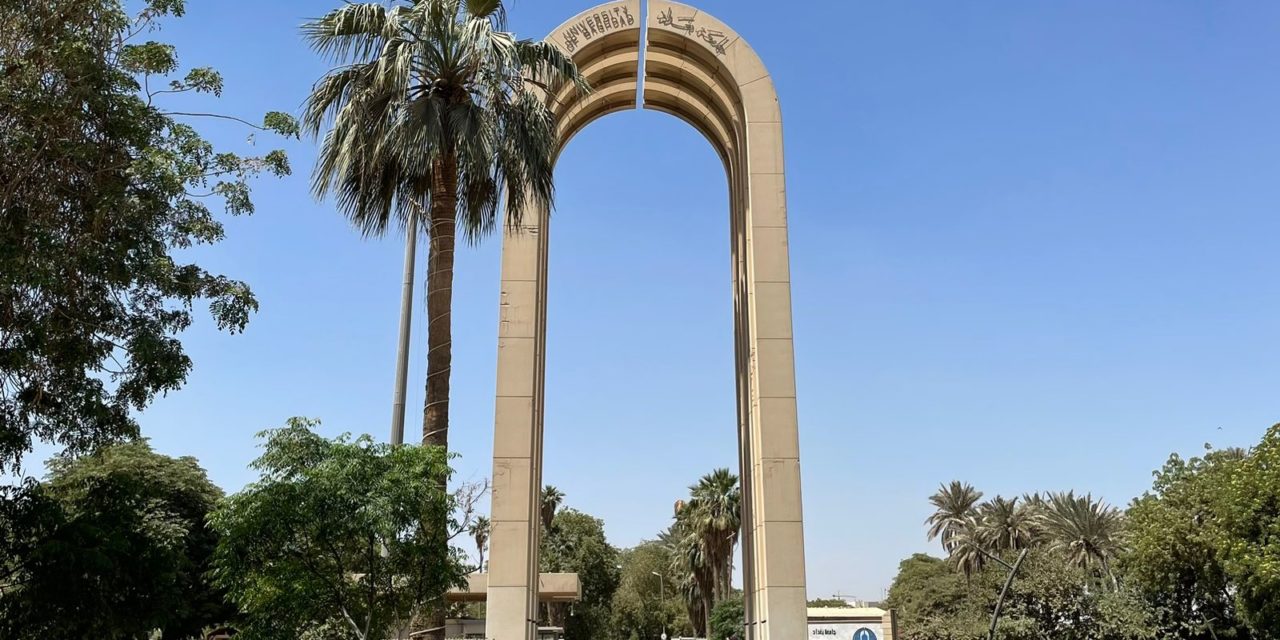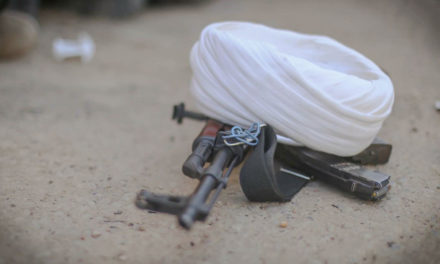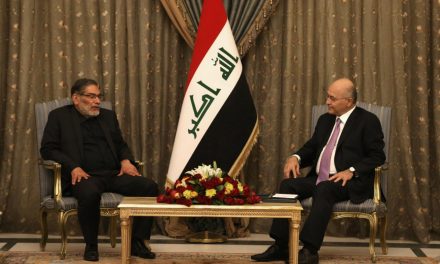After the myth of Iraqi weapons of mass destruction was proven false, U.S. policymakers justified the war as an effort to democratize the country and “liberate” Iraqi women by freeing them from Saddam Hussein’s oppressive regime. President Bush claimed, “The advance of freedom in the greater Middle East has given new rights and new hopes to women there”. Bush also proclaimed, “Every woman in Iraq is better off because the rape rooms and torture chambers of Saddam Hussein are forever closed”. Furthermore, some Western scholarly perspectives defended the wars in Iraq and Afghanistan and some even consider the U.S. as the sole superpower and the only force that could bring women’s rights to certain nations. However, the Bush administration’s rhetoric and assertions that the 2003 war had delivered democracy and freedom to Iraqi women are blatantly false, especially as the situation for Iraqi women – and particularly their access to quality education – was challenged by the invasion and subsequent violence.
Historically, the Iraqi educational system, prior to the 1990s, was primarily considered one of the best in the Middle East. However, as a result of the Iran-Iraq War, the Gulf Wars, and the United Nations’ Security Council sanctions, illiteracy sharply rose, particularly in the southern and central areas, where parents were compelled by the difficult economic conditions to force their children out of school and into labor. There was a significant drop in the number of girls who went to school because their families could not afford it. In some cases, families sent boys instead of girls because they believed that men would help boost the family income since they frequently took on the responsibility of supporting their families. Girls, on the other hand, would get married and join another family, particularly in some rural areas.
Iraqi society generally values education, despite the deteriorating system and economic hardship that took hold in the 1990s onwards. For example, parents in middle-class and urban communities continued to place a high value on education and sent their daughters to schools, prompting some to even sell their belongings to pursue a degree. However, the situation put extra pressure on families that could not afford school supplies or private lessons. Many families saw that the benefit of education declined after the deteriorating economic conditions. Also, the rise in unemployment and the decline in salaries in the 1990s forced hundreds of male and female students, instructors, and professors, to drop out of schools and universities and seek alternative jobs to support themselves. However, the economic situation was particularly detrimental to female students, who had less mobility than male students and less options.
The situation continued to deteriorate after the 2003 U.S.-led invasion. In post-2003, I was a student at Mustansiriyah University and later worked in academia in Iraq. I have witnessed how the myth of democracy and liberation associated with the War on Terror impacted Iraqi women. I also witnessed everything that followed the invasion in the education sector. In the months following the U.S.-led invasion, trauma, unrest, and chaos impacted women’s security and well-being. An often-overlooked impact was specifically on women’s access to education, which was reshaped due to violence, the rise of sectarianism, militarism, and terrorism, along with the absence of security within the Iraqi state.
Education resurrected painful memories of oppression as Iraqi women witnessed daily bombings and the kidnapping and killing of their classmates, professors, and families. It became extremely difficult to go to school every day while missing one of our friends or classmates because of the brutal sectarian violence. I, along with many other students, prayed every day that we would return home safely. Our parents found it overwhelming to send us to school in these circumstances. I remember how one of my professors assigned an exam, but we never saw him again and we later found out he had been kidnapped and assassinated. My memories were not different from other students, especially women. I remember when my friend told me that she would, “Prefer to die rather than be kidnapped and bring shame,” to her parents. Indeed, the situation was unbearable.
Educational facilities were specifically targeted by militants. I remember the bombings of Mustansiriyah University in 2007 that killed more than 60 students. It was one of the worst and most horrific incidents that I and hundreds of students experienced at the time. In fact, since March 2003, there have been approximately 700 bombings of schools and educational institutions, 200 fires, and over 3,000 acts of looting, diversely impacting students’ access to their schools.
In those days, violence was simultaneously indiscriminate, and targeted specific communities, including minorities. My friend Alaa, who had dreams of getting her Ph.D., was not even able to get her bachelor’s degree. She left school due to a violent situation in 2005 when her parents forced her to marry rather than complete her degree. Many girls like Alaa did not have a chance to follow their educational ambitions. Meanwhile, the escalating acts of violence that targeted Iraqi Christian communities in Baghdad in 2004 resulted in most Christian students – including two of my friends – dropping out of university and leaving the country between 2005 and 2007. After Al-Qaida’s increasingly savage attacks on Christians’ homes, churches, and families, which forced hundreds of families to evacuate, an unexpected number of Christian students quit schools and universities permanently.
Women also faced another wave of violence and displacement that directly impacted their education when ISIS took control of several Iraqi cities in 2014. The brutality of ISIS exacerbated pressures on men and women and further restricted women and young girls when it came to education. Families were concerned about the safety of their daughters. Meanwhile, ISIS not only obstructed and repressed the rights of Iraqi women but also murdered, raped, tortured, and kidnapped thousands of Iraqi Yazidi women and girls. The extremist ideology of ISIS forbade women from appearing in public or attending school, requiring them to don the niqab, which is a face covering. The conflict with ISIS worsened the circumstances for women and decreased their enrolment in schools that were in controlled territories. This was primarily in Ninawa, Anbar, and parts of Salahaddin and Kirkuk.
How women presented themselves in educational spaces – their ways of dressing, also came under scrutiny and made accessing education difficult. In the days following the removal of Saddam Hussein in 2003, a security guard at Mustansiriyah University – the second largest public university in Baghdad – forbade female students from entering without wearing a hijab or while wearing a full face of makeup. They enforced a dress code that suppressed women’s rights, which was in violation of the Iraqi constitution that protects the basic rights of all Iraqis, regardless of religion or ethnicity.
Many of my Christian friends were forced to wear a hijab. In fact, Muslim and non-Muslim female students were required to wear it by some university administrators with political ties. Although the hijab has never been directly and formally imposed on schools and universities, there have been attempts from some conservatives whose voices have risen since 2003. For example, I witnessed administrations of some universities in Baghdad hanging signs to dictate how females dress or wear makeup. Other signs advised females and males to avoid mixed-gender gatherings. In 2022, a campaign was launched by Iraqi activists against compulsory hijab wearing in some schools. They highlighted the issue by launching the hashtag #NoToCompulsoryHijab, demanding that women and girls have the right to choose whether to adhere to wearing a hijab. Women activists also criticized some schools’ actions that promoted and celebrated “Taklif” which is a ceremony that signaled girls reaching the age of religiously mandated prayer and hijab (around the age of puberty).
The above changes are both a reaction to increasing insecurity and increasing empowerment of more conservative views in Iraqi society. Additionally, in post-2003, the influx of Islamist parties intensified the social conservatism that impacted women’s access to education. Social conservatism had already grown throughout the Faith Campaign of Saddam Hussein in the 1990s, which was used for its political agenda. New conservativism in post-2003 enhanced the traditionally patriarchal society. Patriarchy plays an active role in cultural norms, especially in rural areas. Women play a minor role in society. As a result, empowered and educated women are typically not given top priority. Patriarchy in Iraq is blatantly present in many aspects of daily life, including education. As Iraqi sociologist Zahra Ali argues, while men and women academics shared general circumstances of violence, women endured specific gender burdens that related to, “…prevailing cultural attitudes, social norms, and practices that are being reinforced by a general social climate of social conservatism toward women”. Moreover, with the escalation of violence and harassment toward women, many religious men tried to impose gender ideology. For example, an Imam at a Baghdad mosque said in 2006, in the midst of sectarian violence, “These incidents of abuse just prove what we have been saying for so long. That it is the Islamic duty of women to stay in their homes, looking after their children and husbands, rather than searching for work”.
Today, based on a more recent UNICEF report, nearly 3.2 million school-age children in Iraq are not attending school. Girls are more vulnerable than boys for the reasons that are outlined above. The situations that women had to face, including violence, wars, and displacement, drastically impacted and undermined women’s right to an education. Although today the occupation has ended and ISIS has been effectively defeated, the legacy of this violence and political upheaval will have a long-lasting impact on generations of Iraqi women to come.
This essay is part of a special series – Iraq after 2003: The Voices of Iraqi Women

Rasha Al-Tameemi
Rasha Al-Tameemi is a Ph.D. candidate at the University of North Texas. She is interested in Middle East-U.S. relations, communism in Arab world in the 20th century, identity politics in post-invasion Iraq, and women’s rights and gender. She received her bachelor’s degree in history at Mustansiriyah University, Baghdad in 2006. She received her master’s degree in history at Texas Woman’s University in 2018.










